Did you know otaku culture began in the 1970s and 1980s with manga and anime in Japan? It was first given as an insult but changed its meaning. Now, it includes all fans who are very into things they love, like anime, manga, gaming, and cosplay.
Key Takeaways:
- The term ‘otaku’ has evolved from a derogatory label to a broader portrayal of passionate fandom across various hobbies and interests.
- The birth of Otaku culture can be traced back to the 1970s and 1980s, coinciding with the rise of manga and anime in Japan.
- Otaku culture encompasses diverse subcultures such as anime, manga, gaming, cosplay, idol otaku, train enthusiasts, and military otaku, each with its distinct characteristics and communities.
- Japan saw a shift in societal perceptions of Otaku over time, transitioning from negative stereotypes to a more varied and nuanced understanding.
- Otaku culture has significantly influenced various industries, including anime, manga, video games, and merchandise, boosting Japan’s entertainment sector.
The Origins of Otaku Culture
During the 1970s and 1980s, the word “otaku” started in Japan. At first, it described people really into manga, anime, and media. Over time, it broadened to include passionate fans of various hobbies.
Otaku culture began as manga and anime got popular in Japan. Creators began engaging fans by promoting their work through many media. This drew in a dedicated fanbase, setting the stage for otaku culture’s growth.
In the 1980s, manga and anime became extremely well-liked in Japan. By the end of the decade, Japan had over 100,000 dedicated otaku. In 1989, “otaku” became a mainstream term, accepted across Japanese society.
By the 2000s, otaku shifted their focus from science fiction to manga, anime, and more adult themes. This change was a major shift for otaku culture.
Otaku culture sparked the creation of books, movies, and art forms. These expressed both admiration and concern for fan subcultures. While it highlighted creativity and diversity, it also sparked worries about youth behavior.
So, otaku culture began in the 1970s and 1980s, when manga and anime grew in Japan. With strategies like media mixes and strong fanbases, otaku culture became a big part of Japanese pop culture. It also influenced fan communities worldwide.
Evolution of Otaku Culture
The story of otaku culture is fascinating, full of twists like stigma turning into celebration. Early on, in Japan, “otaku” was a bad word. It singled out people obsessed with manga, anime, and more. But when shows like “Dragon Ball” and “Naruto” hit it big in the late 1990s and 2000s, everything changed. Otaku soon became more positive or just neutral – especially outside Japan.
Even with its spread around the world, Americans sometimes debate what “otaku” really means. There’s talk about if it’s okay for non-Japanese to call themselves otaku. This chat reflects how otaku culture has been changing over time.
A lot of big moments helped otaku culture grow. For example, in 1990, “otaku” popped up in Usenet posts in the U.S. This showed its growing popularity among American anime fans. In 1993, the anime “Otaku no Video” made the word even more known among Western fans. A Kickstarter for its Blu-ray release raised a huge $100,000. This money really showed how much people care about otaku culture.
“Toshio Okada, in his book ‘Otaku are Dead’ published in 2008, claimed a disillusionment with the rise of moe anime, which he believed skewed the image of otaku.”
Though it’s had its challenges and faced stereotypes, otaku culture thrived. It’s now widely embraced and celebrated. Today, otaku means someone really into a niche hobby or interest. Its fans come from all over, showing just how big of an impact otaku culture has on the world.
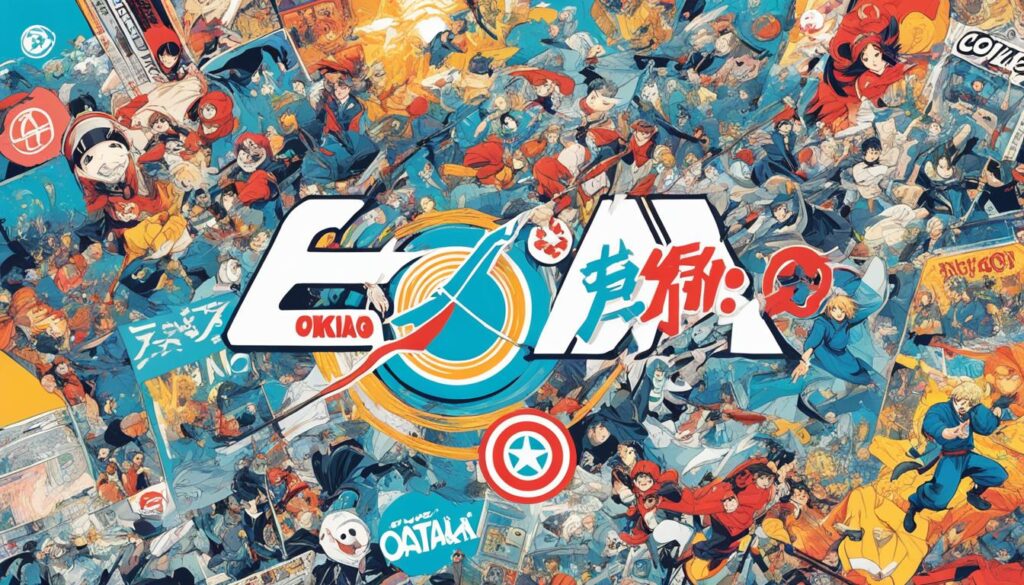
Subcultures within Otaku Culture
Otaku culture is a diverse subculture with many interests and hobbies. It includes various subcultures, each with unique customs and communities. These subcultures enrich otaku culture’s tapestry.
Anime and Manga Enthusiasts
The anime and manga community is a key part of otaku culture. Fans dive deep into Japanese animation and comics. They keep up with the latest releases, talk about stories and characters, and collect merchandise. At conventions and events, they can meet others, do cosplay, and see fan art.
Gamers
Gaming is another major part of otaku culture. Gamers love playing video games from Japan and worldwide. They explore game worlds, play multiplayer games online, and join e-sport competitions. They value the art and stories in video games, from retro games to the most recent.
Cosplayers
Cosplay is about dressing up as characters from anime, manga, and games. Cosplayers work hard to look exactly like their favorite characters. They share their costumes at events, do photoshoots, and post online. It’s a way to connect with fans who love cosplay.
Idol Fans (‘Wota’)
Idol fans, or ‘Wota,’ support Japanese idols who sing, dance, and act. Wota buy idol merchandise, go to concerts, and join fan clubs. The idol subculture is a big part of otaku culture with fans forming their own communities.
Train Enthusiasts (‘Densha Otaku’)
Train enthusiasts, known as ‘Densha Otaku,’ love everything about trains. They enjoy train-spotting, collecting model trains, and attending train events. Their love for trains adds to the diversity of otaku culture.
Military Aficionados
Military interests are part of otaku culture too. Fans learn about military history, weapons, and tactics. They share their knowledge online, collect artifacts, and attend events. Their love for all things military is a unique part of otaku culture.
These subcultures show the variety and richness of otaku culture. From anime fans to gamers, cosplayers, idol fans, train enthusiasts, and military aficionados, each group adds something special.
Influence of Otaku Culture on Mainstream Culture
Otaku culture has changed the mainstream in big ways, especially in entertainment. Events like Comiket in Tokyo and Anime Expo in Los Angeles are huge. They let fans get together, share their love for anime, manga, and games, and show off their creative work. These events not only draw huge crowds but also bring in a lot of money for local businesses.
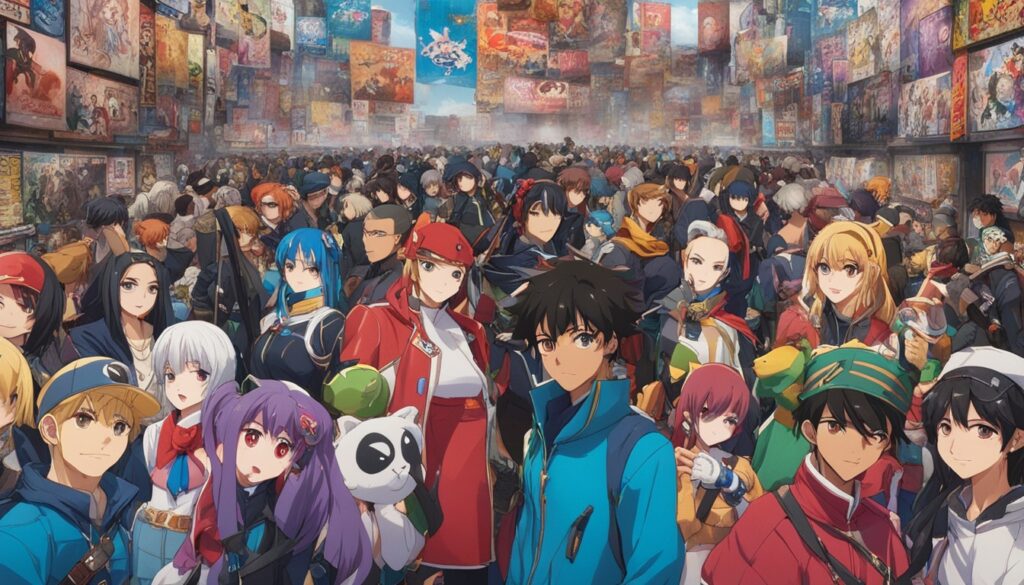
Akihabara in Tokyo is like a holy place for otaku, known as the “mecca”. It’s full of shops, arcades, and cafes dedicated to their favorite shows and games. People from all over visit Akihabara to buy cool stuff, enjoy the atmosphere, and be part of the otaku world.
Otaku culture has even influenced how we dress and talk. The unique styles from anime and manga often show up in our everyday clothes. Plus, thanks to otaku, words like “kawaii” (cute) and “tsundere” are now known worldwide.
“Otaku culture has become a driving force in shaping modern pop culture and has transcended its niche origins to become a global phenomenon.”
Worldwide, many love shows and comics touched by otaku culture, such as “Neon Genesis Evangelion” and “One Piece”. These works are popular not just with avid fans but with everyone, bridging the gap between what’s mainstream and what’s not.
The love for otaku stuff has a real economic impact. People buying DVDs, comics, games, and gadgets play a major role in Japan’s entertainment sector. Also, the excited fans who visit places like Akihabara boost tourism and spending.
| Impact of Otaku Culture | Sector |
|---|---|
| Increase in anime and manga sales | Entertainment industry |
| Boost in tourism | Travel and hospitality |
| Growth of local businesses catering to otaku needs | Retail and commerce |
| Job creation in the anime, manga, and gaming industries | Employment sector |
To sum up, otaku culture has deeply influenced our mainstream and how we entertain ourselves. It’s not just about cool events and places like Akihabara. It’s changed our style, our language, and even our economy. Otaku culture remains lively and important, touching fans and the broader public alike.
Economic Impact of Otaku Culture
Otaku culture is all about love for manga, anime, and more. It has a deep economic influence, especially in Japan. Fans, known as otakus, spend a lot on items like DVDs, manga, games, and merch. This spending supports the entertainment industry a lot.
Tourism is also a big part of otaku culture’s economic success. Places like Akihabara in Tokyo, famous as an ‘Otaku Mecca,’ draw visitors. People come from all over seeking a taste of Japanese pop culture. This boosts Japan’s tourism numbers and helps the local economy.
| Statistics | Value |
|---|---|
| Estimated value of the anime industry in Japan | $20 billion |
| Market size of the anime industry in 2019 | 2.15 trillion yen |
| Number of jobs created by the anime industry in 2017 | 153,000 |
| Export value of anime-related products in 2019 | $3.4 billion |
Events like Comiket also make a big impact economically. Thousands gather, creating a huge market. Income comes from tickets, sales, and other economic boosts like travel spending.
But, the anime world is not without its troubles. Piracy is a big issue, causing losses in revenue. Also, other countries like South Korea and China are becoming contenders in the anime scene.
Still, otaku culture’s value in jobs, spending, and tourism remains strong. It’s more than just entertainment; it’s a key player in the economy globally.
Social Perceptions of Otaku
The views on otaku in Japan have changed a lot over time. At first, they were seen as shy, odd people who avoided others. They loved manga and anime. Sadly, there were some criminal cases, like the one including Tsutomu Miyazaki in 1988, that made the public see otaku in a bad way. This hurt the otaku image.
As anime and manga became more popular everywhere, the way people saw otaku changed. People started to understand otaku better. They are now seen as part of a culture that is interesting and unique.
Today, otaku are seen in a good light. Their love for their hobbies is admired. Otaku culture has many different parts, showing how rich and varied it is.
People are working to show the positive side of otaku culture. People like Toshio Okada and the show Otaku no Video are changing stereotypes. Now, otaku culture is valued for its creativity and strong community.
The opinion on otaku is getting better around the world. In Japan, the term otaku is now more neutral. People see otaku as having many interests and making positive contributions to society.
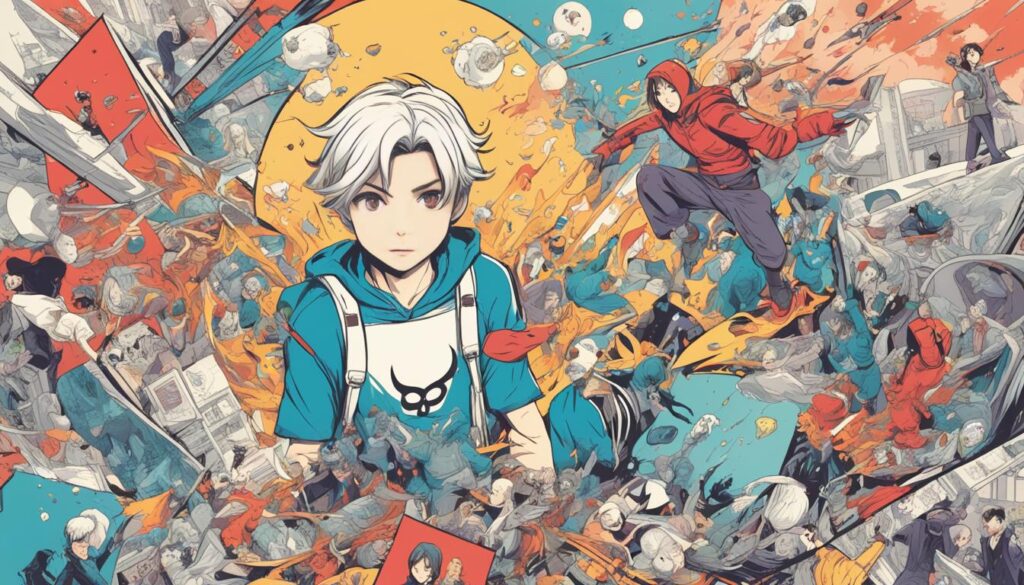
Importance of Understanding and Appreciating Otaku Culture
It’s important to get into otaku culture for many reasons. This unique culture boosts creativity and imagination. It opens the door to worlds with interesting stories and characters. Fans find inspiration to show their creativity in different ways.
Otaku culture values everyone, no matter their differences. Fans from all walks of life come together. They share a deep love for anime, manga, and games. This connection forms strong bonds and lasting friendships worldwide.
“Otaku culture promotes diversity and inclusivity, bringing fans of all ages, genders, races, and backgrounds together.”
Otaku culture also bridges gaps between Japan and the rest of the world. Fans learn about Japan’s culture and values from their favorite shows and games. This learning brings a greater understanding of Japan’s global influence. It also helps fans from different countries connect and share stories.
This culture isn’t just about fun; it also boosts economies. The anime and manga world is worth billions and creates jobs. Big events like Comiket in Tokyo draw fans from all over. This boosts tourism and helps local businesses.
“The Otaku culture has had a substantial economic impact on Japan, fueling the entertainment industry, contributing to tourism, and generating revenue through conventions like Comiket.”
In the end, getting into otaku culture is good for everyone. It promotes creativity, celebrates diversity, and helps economies grow. By diving into anime, manga, and games, it brings people closer, letting them share in the love for Japanese pop culture.
Characteristics of Otaku Culture
Otaku culture is all about being a superfan of anime, manga, and video games. Those who are part of it really love what they follow. They are always getting involved with their favorite shows and games. Let’s look at what makes otaku culture special.
- Passionate Fandom: Otaku fans truly adore anime, manga, and games. They enjoy watching, making, and collecting items from their favorite series.
- Cosplay: Dressing up as characters from their favorite shows is a big deal for otaku. It lets them show off their creativity and love for these characters at events and parties.
- Online Communities: Otaku love to meet up in online groups. Here, they talk, share fan art, theories, and more with people who love the same stuff as they do.
Being an otaku means it’s cool to be passionate about geeky things. It makes fans feel like they belong to a bigger, friendly group. It’s a place where loving anime, manga, and video games is awesome.
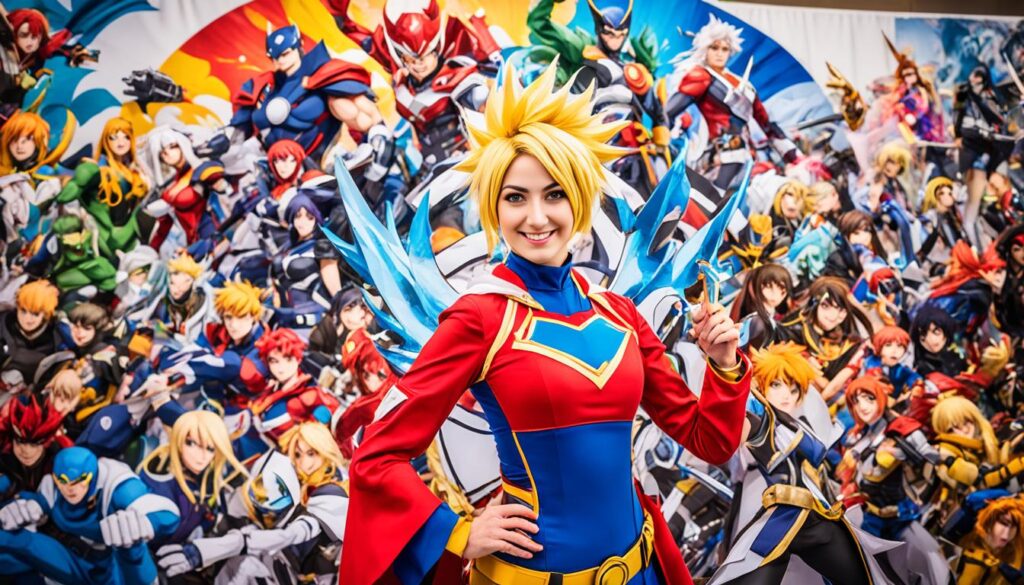
Otaku Activities: A World of Fandom
An otaku loves various activities that show their deep passion for anime and manga. They dive into these worlds, enjoying the newest episodes and chapters. Plus, they love to build their collections with items like figurines and posters.
Many otaku enjoy going to conventions. Conventions are fun-filled events where they can meet others with the same interests. There, they can see new releases and take part in interesting talks.
Cosplay – acting as favorite characters – is very popular. Otaku work hard to make detailed costumes of these characters. They then wear them proudly to conventions and other events.
Online groups are important for otaku. They provide a place to chat, share, and create. There, fans can talk about their favorite shows or share their own drawings and stories.
“Being an otaku means immersing oneself in a world of animated wonders, connecting with a global community of fellow enthusiasts.”
As the otaku world changes, fans will keep finding new ways to enjoy and express their love for anime and manga. Otaku culture is for everyone, bringing people together in a fun, welcoming space.
Otagei: The Art of Fan Performance
In the lively otaku culture, there’s a thrilling phenomenon called Otagei. This form of fan performance is all about waving glow sticks, doing dance moves, and chanting during anime or idol concerts. It helps fans feel closer to their favorite songs and characters.
The unique Otagei brings fans together who love anime and idols. Around 30 fans perform together for 50 minutes without break. They use various props to keep the show visually exciting and dynamic.
The Three Blocks of Otagei Performances
Otagei shows are split into three parts: pre-set, main medley, and the finale or encore. The pre-set gets the audience ready by giving them props. Then, the main part starts, with everyone dancing and chanting, leading to different reactions from those watching.
Different people react to Otagei in various ways. Japanese fans might act reserved, but fans from other countries might participate loudly. This shows how it crosses cultural boundaries.
Polarizing and Impactful Performances
Many feel strongly about Otagei, either loving or finding it hard to understand. It definitely makes a lasting impression, stirring up a lot of feelings. This makes it stand out in the otaku world.
To an outsider, Otagei reflects modern Japanese culture, showing its passion and strong bonds. It’s a way to celebrate their shared love and connection for anime and idols.
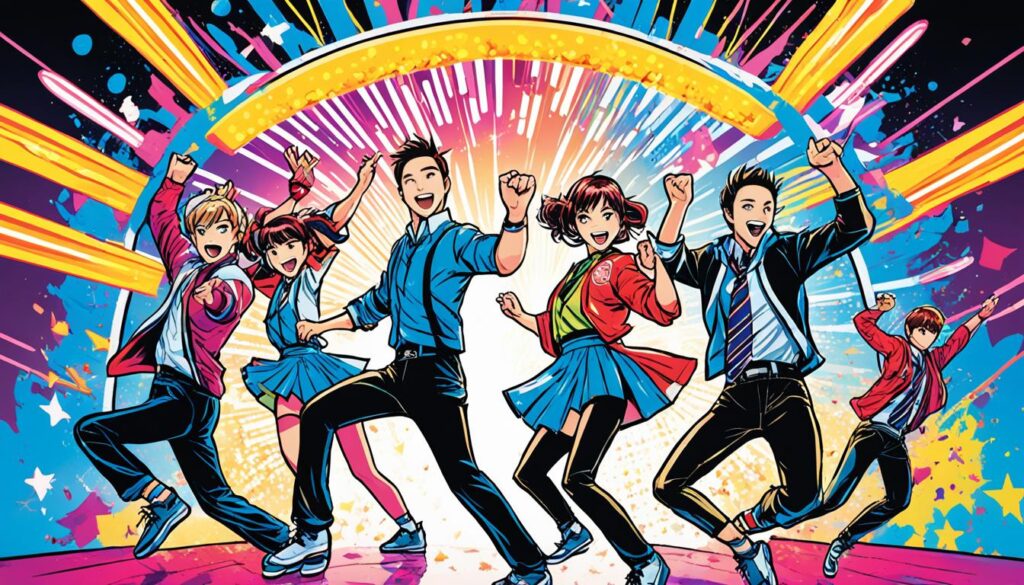
The Artistic Endeavors Emphasizing the Audience
Otagei is unique because it puts the audience at the center of the show. The goal is for everyone to feel like they are a part of the performance. This way, they all celebrate together.
By involving the fans, Otagei goes beyond just a stage act. It’s about joining together in the love for anime and idols. This strengthens the bond in the otaku community.
Vocabularies You Need To Know
Exploring the otaku world is amazing. To really get it, you should learn these words. They’ll help you get into this lively subculture:
Anime
Anime means Japanese animated shows or movies. They range from action to romance and beyond. There’s something for everyone.
Manga
Manga are Japan’s comic books or graphic novels. You read them from right to left. They come in many genres and styles of storytelling.
Cosplay
Cosplay is all about dressing up as your favorite character. It can be from anime, manga, video games, or other media. People put a lot of effort into their costumes.
Otaku
Otaku describes someone deep into anime, manga, or Japanese pop culture. It’s a term that shows their passion and dedication to these hobbies.
Gachapon
Gachapon are vending machines with capsule toys inside. They’re a fun way for fans to collect items from their favorite shows or characters.
Kawaii
Kawaii means “cute” in Japanese. It’s a word used to describe anything that’s sweet and charming. Think adorable animals or characters.
Waifu
Waifu comes from “wife.” It’s a term for a favorite fictional female character. Fans use this word to show their strong emotional connection to her.
Senpai
Senpai is for someone older or more experienced. In otaku culture, it refers to someone you look up to. It’s a sign of respect for an admired person.
Subs vs. Dubs
There’s a big debate in anime over subs (subtitles) and dubs (English voice-overs). Fans argue which version is truer to the original feeling.
Fandub
A fandub is a fan’s re-make of an anime or manga. They replace the original voices with those of fans. It’s a fun project for some enthusiasts.
Learning these otaku words will help you talk to other fans and dive deeper into the otaku culture. Enjoy your journey in this exciting world!
Conclusion
Otaku culture is a vibrant subculture that celebrates diversity, creativity, and passion. It started in Japan but has gone global, influencing many areas. This includes mainstream culture and the entertainment industry.
It’s important to understand and appreciate otaku culture. It brings people from different backgrounds together. Everyone can celebrate their common interests. This culture also helps people empower themselves. It encourages freedom in expressing their passions.
Celebrating otaku culture helps us see the value of diversity. Diversity enriches our thoughts and results. We must avoid ignorance, which can slow down progress. Through talking, accepting, and respecting each other, we can make a society that honors all diversity.
So, let’s join together to celebrate otaku culture. Let’s welcome its diversity and recognize the joy it spreads worldwide.
FAQ
What is otaku culture?
Otaku culture is a deep passion for Japanese pop culture. People who love anime, manga, and video games are part of it. They have a lot of knowledge and own many related things.
How did otaku culture originate?
It started in the 1970s and 1980s with the growth of manga and anime in Japan. Japanese animation studios and manga publishers also played a big part. They promoted their content together, which made fans very dedicated.
How has otaku culture evolved over time?
In the 1980s and 1990s, a lot of people had a bad view of otaku. This was because of some criminal cases. But by the late 1990s, many people loved anime like “Dragon Ball” and “Naruto.” This made the term more positive.
What are the subcultures within otaku culture?
Otaku culture contains many subcultures. These include fans of anime, manga, video games, and cosplayers. But there are also idol fans, train lovers, and war history buffs.
How has otaku culture influenced mainstream culture?
Otaku culture has greatly influenced the world. It’s behind big events like Comiket in Tokyo and Anime Expo in Los Angeles. Akihabara in Tokyo is a hub for anime and manga fans. It has changed fashion, language, and even society.
What is the economic impact of otaku culture?
In Japan, otakus buy a lot of DVDs, manga, and games. This spending helps the country’s entertainment industry a lot. Akihabara and other such places attract many tourists. This helps Japan’s economy. Events for otakus also make money through tickets and sales.
How have social perceptions of otaku changed?
Initially, people thought otakus were shy and too focused on fantasy. But with anime and manga becoming popular globally, views changed. Now, otaku culture is considered a valuable part of pop culture worldwide.
Why is it important to understand and appreciate otaku culture?
Otaku culture promotes creativity and brings people together. It welcomes all kinds of fans. It connects people internationally and teaches about Japan. It also helps in job creation and promotes local creativity.
What are the characteristics of otaku culture?
Otaku love and know a lot about anime, manga, and games. They collect items, do cosplay, and create fan art. They find community online and freely express their love for these hobbies.
What activities do otaku engage in?
Otaku enjoy anime, manga, and collecting items. They like going to events, doing cosplay, and being part of online groups. These activities connect them with others who share their interests.
What is otagei?
Otagei is a special fan activity. It includes dancing, waving glow sticks, and chanting. Fans do this at anime and idol concerts. This way, they enjoy the music and support their favorite characters.
What are some otaku vocabularies to know?
Otaku have their own language for talking about their favorite series and hobbies. To be part of the culture, you should know these words. They cover anime, manga, and cosplay, among other things. For example, words like otaku, manga, and cosplay are important to learn.
